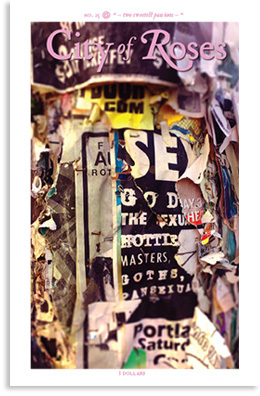Kip Manley's Blog, page 48
September 14, 2015
No. 25: two sweetest passions (Opening)
Slouching through the Door – a Scum of whited sugar –
September 3, 2015
Things to keep in mind (The secret of conceit)
The literary America in which I found myself after I published The Twenty-Seventh City bore a strange resemblance to the St. Louis I’d grown up in: a once-great city that had been gutted and drained by white flight and superhighways. Ringing the depressed urban core of serious fiction were prosperous new suburbs of mass entertainments. Much of the inner city’s remaining vitality was concentrated in the black, Hispanic, Asian, gay, and women’s communities that had taken over the structures vacated by fleeing white straight males. MFA programs offered housing and workfare to the underemployed; a few crackpot city-loving artists continued to hole up in old warehouses; and visting readers could still pay weekend visits to certain well-policed cultural monuments—the temple of Toni Morrison, the orchestra of John Updike, the Faulkner House, the Wharton Museum, and Mark Twain Park.
By the early nineties, I was as depressed as the inner city of fiction. My second novel, Strong Motion, was a long, complicated story about a Midwestern family in a world of moral upheaval, and this time, instead of sending my bombs in a Jiffy-Pak mailer of irony and understatement, as I had with The Twenty-Seventh City, I’d come out throwing rhetorical Molotov cocktails. But the result was the same: another report card with A’s and B’s from the reviewers who had replaced the teachers whose approval, when I was younger, I had both craved and taken no satisfaction from; decent money; and the silence of irrelevance. Meanwhile, my wife and I had reunited in Philadelphia. For two years we’d bounced around in three time zones, trying to find a pleasant, inexpensive place in which we didn’t feel like strangers. Finally, after exhaustive deliberation, we’d rented a too-expensive house in yet another depressed city. That we then proceeded to be miserable seemed to confirm beyond all doubt that there was no place in the world for fiction writers.
August 29, 2015
Things to keep in mind (The secret of monsters)
The classical monster, derived from the Latin word monstrare (showing, warning), comes into existence as something that is destined to be shown yet will escape its exhibition.
August 26, 2015
Sundries tallied separately
—Three done; a fourth too long in progress; seven more after that. I should maybe get back to it.
August 22, 2015
Things to keep in mind (The secret of beards)
In England today the fashion of shaving is so nearly universal that you may go about for months and years without seeing a natural beard. Between the native beauty of a great beard that never was touched by razor (here I stroked my hand down the soft Assyrian blackness of my own) and the harsh stiff trimmed beards, and these as a rule, too, old men’s beards, of today, there is as much difference as between the stately elm and its poor limb-lopped brothers in Kensington Gardens. So that the beard has become, from the chief ornament of manhood, the badge of a doddering age grown too idle to use the razor; and that “bloom of youth,” the soft young growth of the beard on a young man’s cheek that the Greeks so much delighted in, is, in this country, as extinct as the osprey or the bustard.
August 21, 2015
Things to keep in mind (The secret of the serial)
We were sorry to observe, in the preface to this work, certain facts stated in order to display the extreme rapidity with which it was written. An epic poem in 12 books finished in six weeks, and, on its improved plan in 10 books, almost entirely recomposed during the time of printing! Is it possible that a person of classical education have so slight an opinion of (perhaps) the most arduous effort of human invention, as to suffer the fervour and confidence of youth to hurry him in such a manner through a design which may fix the reputation of a whole life? Though it may be that a work seldom gains much by remaining long in the bureau, yet is it respectful to the public to present to it a performance of bulk and pretension, bearing on its head all the unavoidable imperfections of haste? Does an author do justice to himself, by putting it out of his power to correct that which he will certainly in a few years consider as wanting much correction? To run a race with the press, in an epic poem, is an idea so extravagant, that Mr. S. must excuse us if it has extorted from us these animadversions. We now proceed to the work itself.
August 16, 2015
Fancy that
I’ll be reading at Reading Frenzy this Thursday, August 20th, as part of the semi-occasional Print Fancy! series of ’zine release parties. Up alongside me will be—
Moe Bowstern, reading from Are You There God, It’s Me, Menopause;
Martha Grover & TJ Acena, reading from Somnambulist no. 26;
Zachary Auburn, reading from How to Talk to Your Cat About Abstinence;
Mary Higgins, reading from Girly Girls;
and CC Teakell, reading from The Exercise Guide for the Hopelessly Depressed.
I am reliably informed there will be slideshows, audience participation, a door-prize, and also refreshments. —I’ll be reading from no. 25, “ – two sweetest passions – ”, though the excerpt in question has little enough to do with either of those. (—Unless, of course, you highly esteem gentrification, and revenge…)
August 13, 2015
Things to keep in mind (The secret of the saga)
The novel, through its protean variations from Proust to the detective story, is almost always analytic: it would be truer perhaps to say that it nearly always employs analytic processes from time to time. But the saga is never analytic. The novelist is often introspective: the saga never.
August 9, 2015
Things to keep in mind (The secret of cities)
Cities attract both those down on their luck and looking for work, and those on a hot streak, looking to celebrate. They attracted the naïve urban planners of the early 20th century who believed a more symmetrical city grid could undo poverty, and at the same time they attracted those who aimed to exploit the poor and disenfranchised through predatory housing schemes. For every art gallery there is an underserved community. For every park, a shelter barely able to serve the people it was built to protect. The truth is that cities offer us a promise that is not always kept. But the promise is vital.
August 7, 2015
No. 24: vilissima et infima (Closing)
a Running shoe, blue & brown




